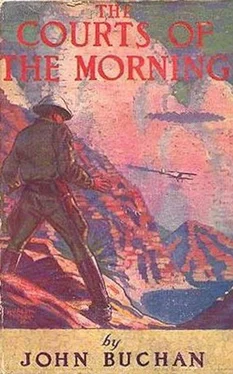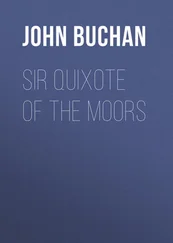John Buchan - The Courts of the Morning
Здесь есть возможность читать онлайн «John Buchan - The Courts of the Morning» — ознакомительный отрывок электронной книги совершенно бесплатно, а после прочтения отрывка купить полную версию. В некоторых случаях можно слушать аудио, скачать через торрент в формате fb2 и присутствует краткое содержание. Жанр: unrecognised, на английском языке. Описание произведения, (предисловие) а так же отзывы посетителей доступны на портале библиотеки ЛибКат.
- Название:The Courts of the Morning
- Автор:
- Жанр:
- Год:неизвестен
- ISBN:нет данных
- Рейтинг книги:3 / 5. Голосов: 1
-
Избранное:Добавить в избранное
- Отзывы:
-
Ваша оценка:
- 60
- 1
- 2
- 3
- 4
- 5
The Courts of the Morning: краткое содержание, описание и аннотация
Предлагаем к чтению аннотацию, описание, краткое содержание или предисловие (зависит от того, что написал сам автор книги «The Courts of the Morning»). Если вы не нашли необходимую информацию о книге — напишите в комментариях, мы постараемся отыскать её.
The Courts of the Morning — читать онлайн ознакомительный отрывок
Ниже представлен текст книги, разбитый по страницам. Система сохранения места последней прочитанной страницы, позволяет с удобством читать онлайн бесплатно книгу «The Courts of the Morning», без необходимости каждый раз заново искать на чём Вы остановились. Поставьте закладку, и сможете в любой момент перейти на страницу, на которой закончили чтение.
Интервал:
Закладка:
I hotly denied the whole thing, but my denials did not carry very far. Sandy had disappeared again, and his absence gave gossip its chance. The ordinary story was that he had taken to drink or drugs--most people said drugs. Even those who believed in him began to talk of a bad break-down, and explained that the kind of life he had led was bound some day to exact its penalty. I tried to get hold of him, but my telegrams to Laverlaw brought the answer that his lordship had gone abroad and left no address for letters.
Three days after Christmas I got the shock of my life. I opened The Times and found on the foreign page a short telegram from New York which reported the death of Mr John Scantlebury Blenkiron on board his yacht at Honolulu. The message said that he had once been well known as a mining engineer, and that at various times he had made coups in Wall Street.
I took the first train to London and interviewed Ellery Willis at the Embassy. He confirmed the news, for he had had a wire from Washington to the same effect.
"What did he die of?" I demanded. "And what was he doing at Honolulu? And in a yacht? He loathed the sea. He used to say that he would as soon take to yachting for pleasure as make his meals off emetics."
"He must have been ill some time," Willis suggested. "That would account for his disappearance. He wanted to be by himself, like a sick animal."
I simply wouldn't credit it, and I asked Willis to wire for details. But none came--only a recapitulation of the bare fact. When a week later I got the American papers, my scepticism was a little shaken. For there were obituaries with photographs. The writers enlarged on his business career, but said nothing about his incursions into politics, nor did they give any further news of his illness. I was almost convinced, but not quite. The obituaries were full, but not full enough, for Blenkiron had been a big figure, and one would have expected the press to go large on his career and personality. But the notices all gave me the impression of having been written to order and deliberately keeping wide of the subject. There was nothing in the way of personal reminiscences, no attempt to describe his character or assess his work. The articles were uncommonly like the colourless recitals you find in a biographical dictionary.
I wired about it to Sandy, and got a reply from his butler that he was still abroad, address unknown. I wished that I knew where to find the niece who had visited Laverlaw in the summer, but Janet Roylance, to whom I applied, could tell me nothing. She and Archie were setting out almost at once on their delayed honeymoon, and had chosen South America.
I have one other incident to record before I bring these preliminaries to a close. Palliser-Yeates came to stay with us for a week-end in January, and one night, after Mary had gone to bed, we sat talking in the library. He had never known Blenkiron, but he was a friend of Sandy, and to him I unburdened my anxieties. I thought he listened to me with an odd look on his face.
"You don't believe the stories?" he asked.
"Not one blessed word," I said. "But the poor old chap has managed to get himself a pretty fly-blown reputation."
"Perhaps he wanted to," was the astounding answer.
I stared, and asked him what he meant.
"It's only a guess," he said. "But Sandy has for a long time had a unique reputation. Not with the world at large, but with the people who matter in two hemispheres. He was known to be one of the most formidable men in the world. Now, suppose that he was engaged, or about to be engaged, in some very delicate and dangerous business. He would be marked down from the start by certain people who feared him. So he might wish to be counted out, to be regarded as no longer formidable, and what better way than to have it generally believed that his nerve had gone and that he was all to pieces? If I wanted to create that impression, I would lay the foundation of it in the Shires, where they make a speciality of scandal. If that was his purpose, he has certainly succeeded. By this time the rumour has gone all over Europe in the circles where his name was known."
I was digesting this startling hypothesis, when Palliser-Yeates told me the following story:
He had been in Paris just before Christmas on some business connected with Argentine banking, and one of his South American colleagues had taken him to dine at a restaurant much in vogue among the rastas. I think it was on the Rive Gauche, not a specially reputable place, but with amazingly good food. The proprietor was from the Argentine, and all the staff were South Americans. Palliser-Yeates noticed one of the waiters, not at his own table but a little way off, and he recognised the man's face. The hair and skin were darkened, but he was positive that it was Sandy--Sandy in a greasy dress suit and a made-up black tie. When the room filled up and got rather noisy, he made an errand to speak to the conductor of the orchestra, and managed to get a word with this waiter. He cannoned against him in one of the doors and said, "Sorry, Sandy." The waiter knew him perfectly, and whispered from behind his pile of dishes, "Don't give me away, John. It's damnably serious. And never come here again." So Palliser-Yeates took himself off, and had scrupulously held his tongue except for telling me. He said that Sandy looked well enough, and seemed to have mastered his job, for you couldn't detect any difference between him and the rest of the outfit.
When I heard this, I decided to go to Paris myself and have a look at the restaurant, for anxiety about Sandy was coming between me and my sleep. There was something about Palliser-Yeates's story which took my memory back a dozen years to old Kuprasso's dancing-house in Constantinople and the man who had led the Company of the Rosy Hours. Sandy was on the war-path again, and I was bound to keep an eye on him.
But two days later I had a letter--from Blenkiron. It had a typed address and a Southampton postmark--which was no clue, for it had probably been brought over by a passenger in a ship and posted at the port of arrival. The handwriting was Blenkiron's unmistakable scrawl. It ran as follows:
"The papers will say I have gotten across the River. Don't let that worry you. But the Golden Shore at present is important and I may have to stay there quite a time. Therefore keep up the requiems and dirges until further notice."
Also at last I got a reply from Sandy, in answer to my string of letters. It was a telegram from London, so he had left Paris, and it merely contained Abraham Lincoln's words: "You stop still and saw wood."
After that I stopped still. Both Blenkiron and Sandy were up to some devilry, and I had an instinct that they were working together. I have set down here my slender personal knowledge of the beginning of the strange events now to be related. The rest comes from the actors themselves.
Chapter I
The open windows, protected by wire blinds as fine-meshed as gauze, allowed the cool airs from the sea to slip in from the dusk. The big restaurant was in a pleasant gloom broken by patches of candlelight from the few occupied tables. The Hotel de la Constitución stands on a little promontory above the harbour of Olifa, so the noise of the streets comes to it only like the echo of waves from a breakwater. Archie Roylance, looking into the great square of velvet sky now beginning to be patterned by stars, felt as if he were still at sea.
The Vice-Consul interpreted his thoughts.
"You are surprised at the quiet," he said. "That is only because we dine early. In a little there will be many lights and a jigging band and young people dancing. Yet we have good taste in Olifa and are not garish. If you will be my guest on another occasion, I will take you to a club as well equipped as any in Pall Mall, or to a theatre where you will see better acting than in London, and I will give you a supper afterwards which Voisin's could not better. We have civilisation, you see--for what it is worth."
Читать дальшеИнтервал:
Закладка:
Похожие книги на «The Courts of the Morning»
Представляем Вашему вниманию похожие книги на «The Courts of the Morning» списком для выбора. Мы отобрали схожую по названию и смыслу литературу в надежде предоставить читателям больше вариантов отыскать новые, интересные, ещё непрочитанные произведения.
Обсуждение, отзывы о книге «The Courts of the Morning» и просто собственные мнения читателей. Оставьте ваши комментарии, напишите, что Вы думаете о произведении, его смысле или главных героях. Укажите что конкретно понравилось, а что нет, и почему Вы так считаете.












